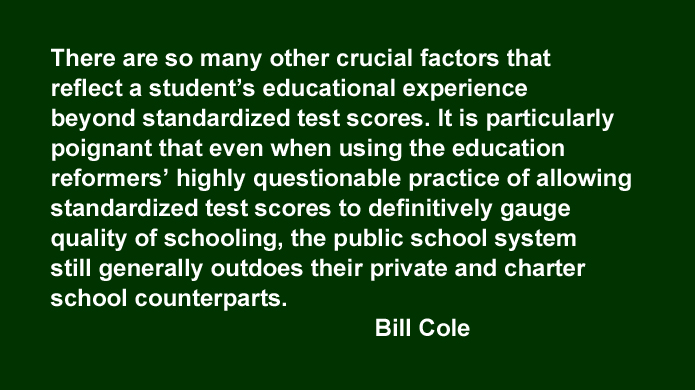By Bill Cole.
As another school year has started, one thing is certain, a vocal coalition of education reformers, market-based advocates and policymakers will continue extolling the virtues of school choice initiatives, such as private school vouchers and charter schools. These groups enthusiastically note that students in independent schools have better academic outcomes compared to their public school peers. They argue that independent schools have autonomy from bureaucracies and unions, which keep public schools from performing as well as private schools. They claim that creating a market of school options will provide competition that will motivate public schools to innovate and to perform better in order to hold on to their student body. They contend that it is somehow cruel to deprive more needy families an opportunity to attend such superior schools in the private sector. The problem with all of this soaring rhetoric is that none of it is supported by the preponderance of the research.
To begin with out-of-school factors such as socioeconomic status, parental involvement and other social supports have been shown to play a substantially larger role on student academic achievement than in-school factors. In-school factors obviously still have a significant effect on academic outcomes and to that extent interesting findings are being uncovered. In their extensive research study, the husband and wife team of Christopher Lubienski and Sara Theule Lubienski, both professors of education at the University of Illinois at Urbana-Champaign, found that public schools generally yield better academic outcomes than their private school counterparts. In their book, The Public School Advantage (see excerpt here) they use a complex statistical analysis involving hierarchical linear modeling on an enormous data set of students and their standardized test scores. The researchers also crucially controlled for out-of-school factors in reaching the conclusion that public schools affected greater improvements in student academic outcomes than did private schools. What was revealed is that the purported academic advantage of private schools over public schools disguises the fact that student achievement is considerably impacted by the many out-of-school factors impacting students. In other words, private schools tend to enroll a pool of students who come from more upwardly mobile backgrounds and whose parents are more directly involved in their children’s education which are factors in themselves that strongly influence higher academic achievement. When the in-school factors are appropriately isolated to measure learning effects, the research unmistakably points to a public school advantage.
Explanations offered for these results include better training for public school teachers than their private school counterparts. A greater percentage of public school teachers graduate from teacher certification programs and are exposed to a richer array of in-service professional development workshops, most commonly provided by the public school districts and teachers unions. Simply put, training matters. Another explanation is that the same autonomy and lack of bureaucratic oversight touted by private school advocates may in fact be leading to curricular and instructional stagnation and a lack of incentive to incorporate cutting edge knowledge in private school classrooms. The Lubienskis’ compelling research has subsequently been replicated with similar results through rigorous research done at Stanford University and Notre Dame as well as the Educational Testing Service. Ultimately, market principles do not work in education due to the inherent mismatch between a market system’s relatively simplistic emphasis on bottom lines (i.e. economic value) and the multifarious and often disparate combination of goals imposed upon universal education (i.e. academic achievement, character development, citizenship, emotional intelligence). There are so many other crucial factors that reflect a student’s educational experience beyond standardized test scores. It is particularly poignant that even when using the education reformers’ highly questionable practice of allowing standardized test scores to definitively gauge quality of schooling, the public school system still generally outdoes their private and charter school counterparts. This is merely an additional boon to the public school system’s already indispensable role as a key hub in every community.
Of course, in a given neighborhood one might identify a private school or charter school that would be preferable to the local public school. However, when aggregate results of academic outcomes establish that public schools are outpacing independent schools on the balance, policy makers should take note. As the empirical evidence mounts it seems clear that our public schools are doing the most outstanding job. In light of this, there needs to be a social recommitment to alleviating poverty, supporting struggling communities and reinforcing parenting skills. Meanwhile, education policy makers of all stripes would be well advised to place their singular focus on devoting resources in to strengthening the public school system to whatever degree possible.
Bill Cole has been a school psychologist in a public school district for 16 years and is an adjunct professor of developmental psychology at Farleigh Dickinson University in New Jersey.





Leave a Reply